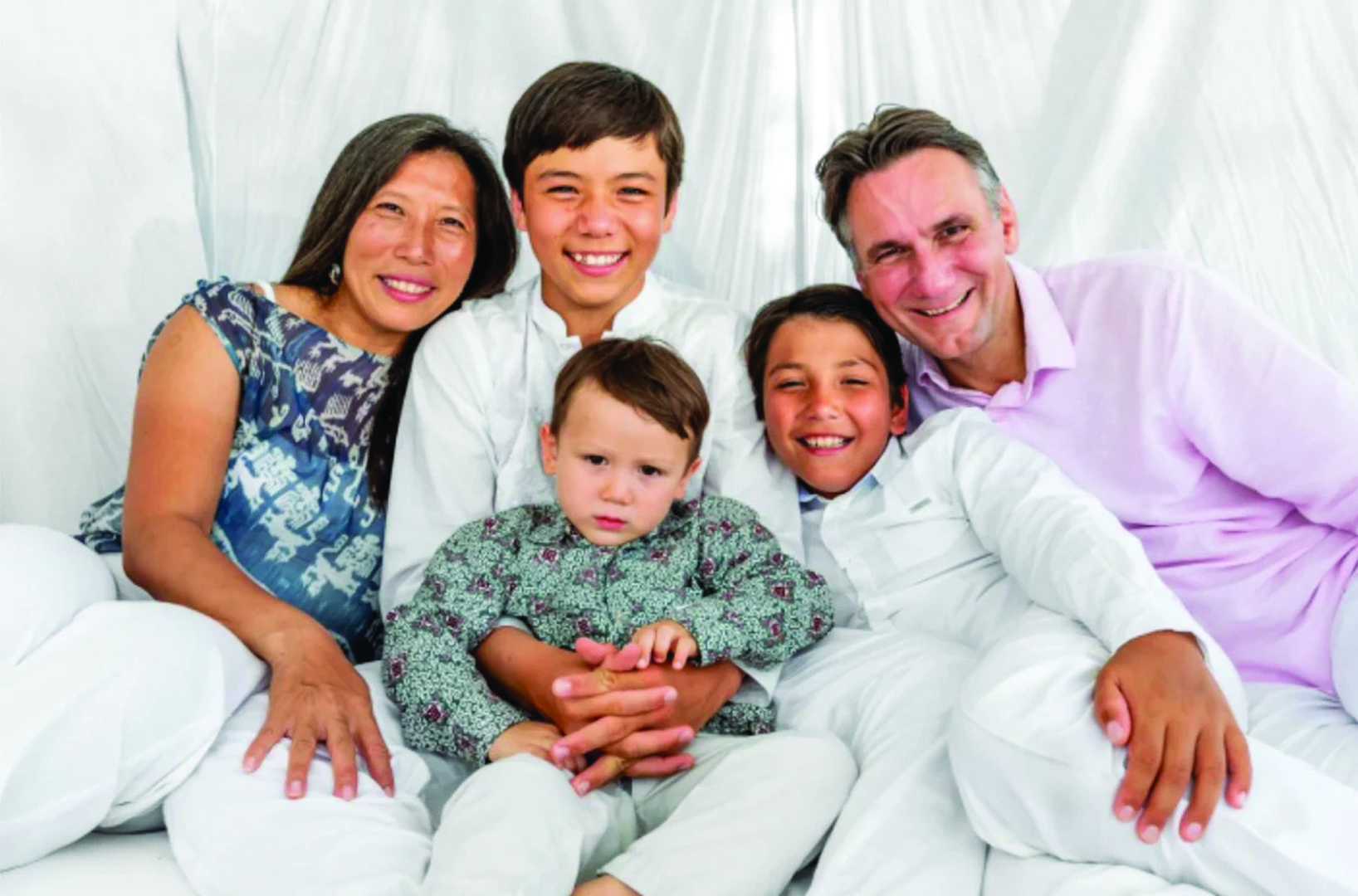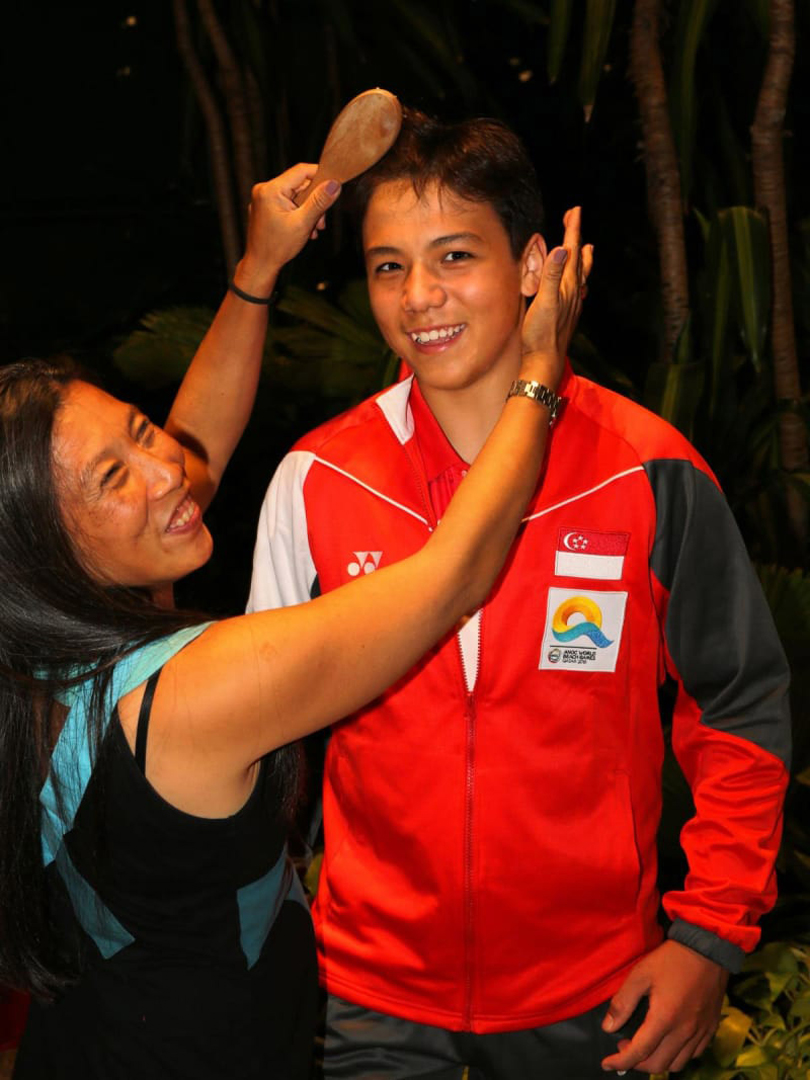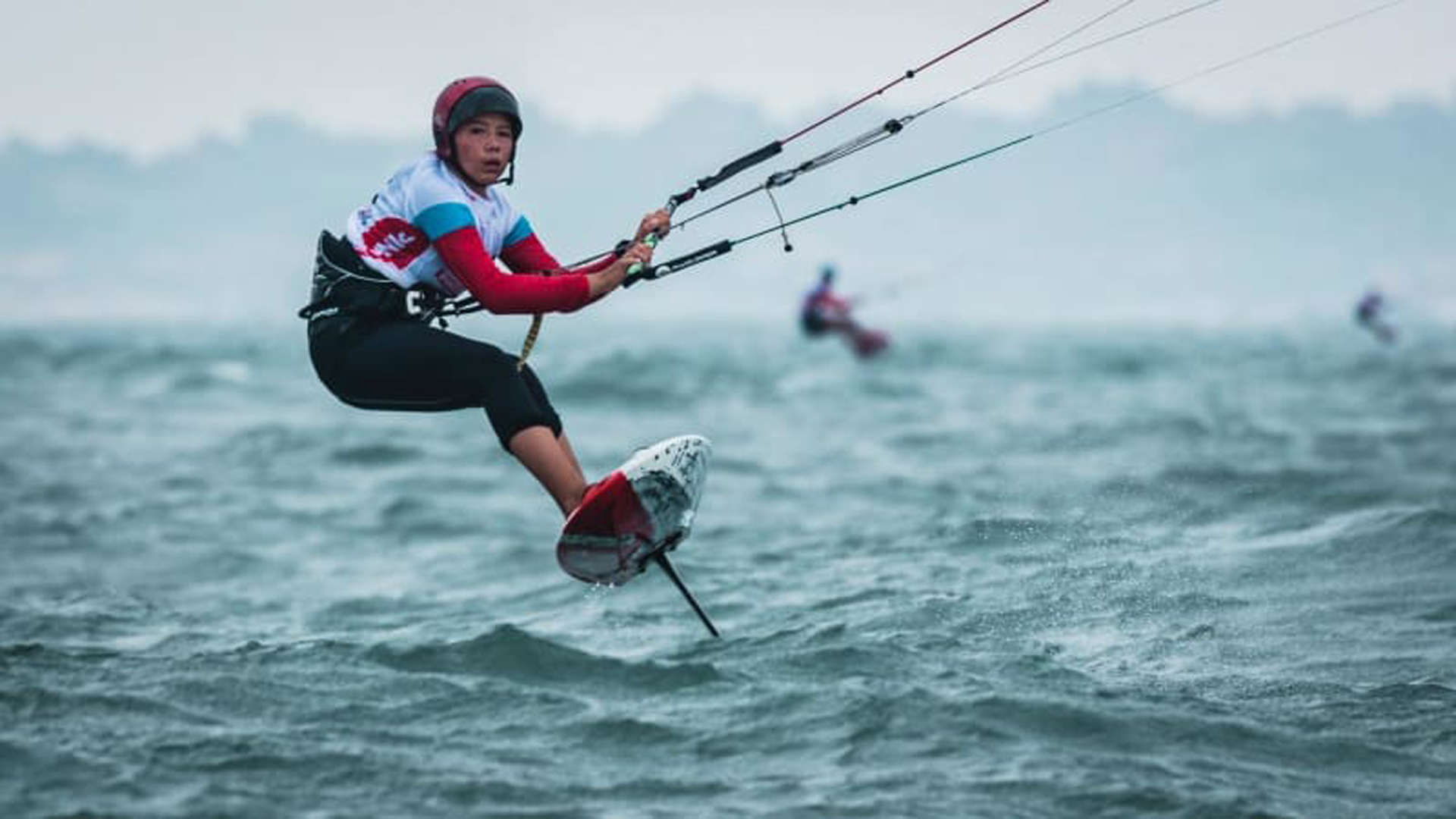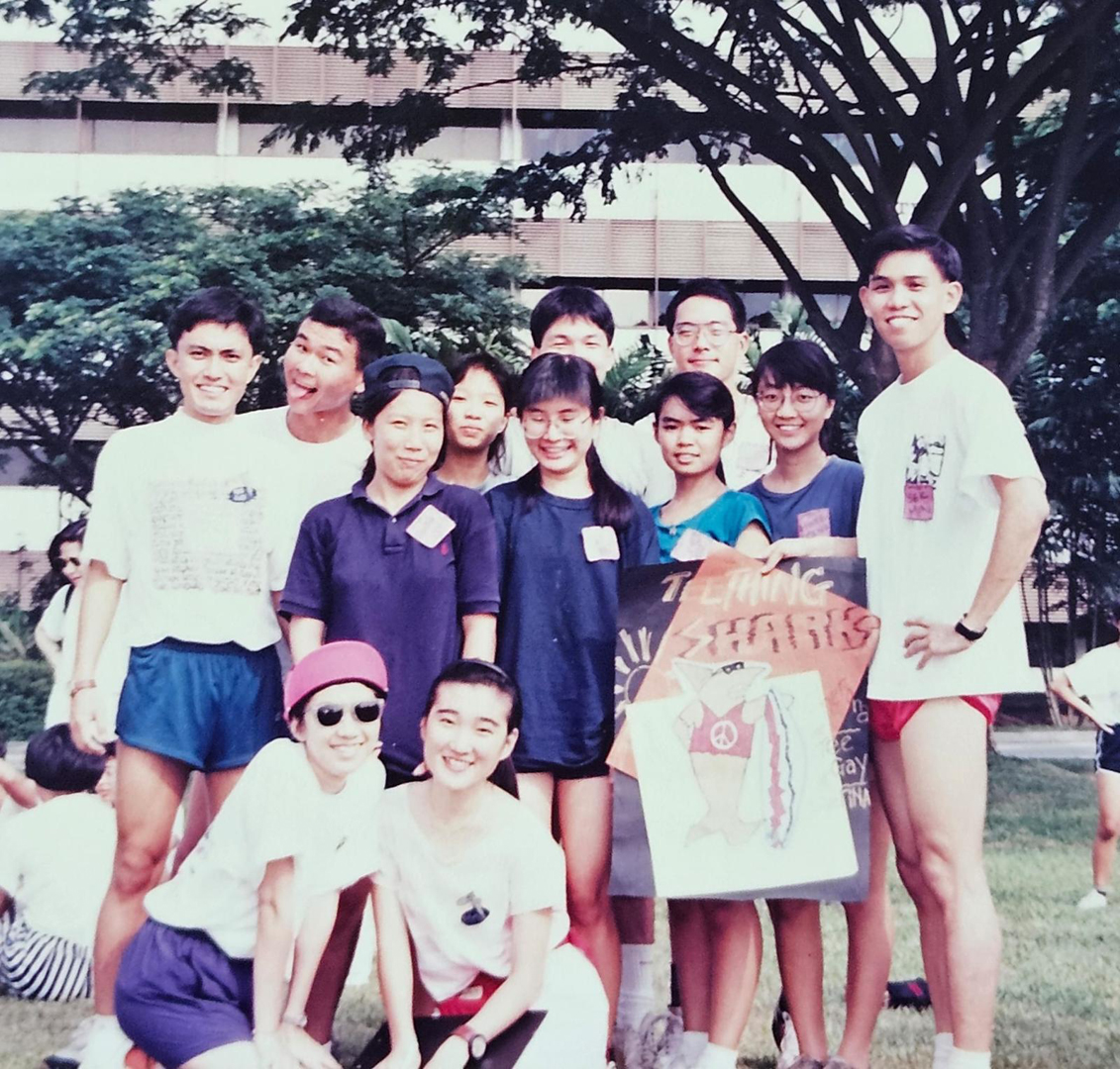21 November 2024
Mother Knows Best
Mrs Hwee Keng Maeder (Arts & Social Sciences ’94) learnt to think differently at university, a quality she has applied to her life — and when parenting a world champion.

The Maeder family, (from left) Hwee Keng, Max, Karl, Valentin, and (front) Valentin Jr.
WHO SHE IS: Mrs Hwee Keng Maeder (née Teng) is the Executive Director of Wakatobi Resort and Liveaboard Yacht. Upon graduating from NUS, she worked in sales for Asian Diver magazine, through which she met her husband, Valentin. Before Wakatobi, Mrs Maeder was a relationship manager with AIG Private Bank and Credit Suisse. She is the mother of Singapore’s youngest Olympic medallist Maximilian Maeder, and his brothers Karl — also a competitive kitefoiler — and Valentin Jr.
When Maximilian Maeder emerged as Singapore’s Olympic medallist on National Day this year — taking home the bronze in the Men’s Formula Kite — all eyes fell on him and his parents, and their unusual approach to raising children. NUS alumna Hwee Keng Maeder, 52, and her Swiss-German husband Valentin Maeder, 60, chose to homeschool their three sons.
Max wowed Singaporeans when he spoke fluently in four languages in interviews: English, Mandarin, German and French. “We’re not a typical family, in that we don’t sit down to meals together regularly, for example,” Mrs Maeder shared with The AlumNUS. “But because of our earlier choices — all those years we never outsourced the raising of our kids — they are very close to us now,” she added. Max, 18, speaks to his parents daily, no matter where he is in the world. His brother, Karl, 15, who lives and trains in Switzerland, does likewise. Then there is Valentin Jr, 8, who is the baby of the family.
Charting Their Own Course
While homeschooling today still raises some eyebrows, it was virtually unheard of when the Maeders had Max. “We followed what we wanted to do, and we wanted the same things: we wanted them to be close to us, we wanted happy children, we wanted to equip them with certain skills. It’s not about content learning, but meta-learning,” Mrs Maeder explained. “We were not anti-establishment. We just wanted content that wasn’t available.” Max did online learning from the age of 8, while Karl began at 6. “The hardest part is not the choice, but the opinions you face,” said Mrs Maeder. The couple faced resistance from her parents as well as his — Mrs Maeder’s late mother-in-law was a schoolteacher.
 Mrs Maeder with a younger Max.
Mrs Maeder with a younger Max.
But for the Maeders, it boiled down to what they both defined as ‘education’. “People think of education as a milestone, a certification. But education comes in many forms,” she said. “The value of school is in shaping the thought process and analytical thinking, to have a certain way to solve problems. With home education, we teach values and manners, so you get children who are considerate.” She added that her husband instilled self-confidence in their children. “It’s a foundation on which to build any education. I think these are the basics: tenacity, grit. That’s the number one thing you need.” The fruit of their unorthodox choice is obvious in Max, whose homeschool journey began when he chose to master kiteboarding, then kitefoiling. Being homeschooled afforded him the time needed to train.
Some have mistaken Mrs Maeder for a ‘tiger mum’. She is, in fact, the very opposite of one. When asked how it feels to raise a champion, she said with a smile. “You can ask me 10 years later.”
She chooses not to define success by output. “I am not outcome-oriented — I only worry about his safety,” she revealed to The AlumNUS. “Max just happens to be a champion. You can’t raise all your kids the same way — we need to parent according to what the child needs. All parents are proud of their kids. It’s just that my pride gets a public platform. I was proud of Max before he became an Olympian.”
 A world champion kitefoilder, Max has benefitted from his parents' approach to learning.
A world champion kitefoilder, Max has benefitted from his parents' approach to learning.
Learning By Doing
Mrs Maeder graduated from NUS in 1994 with a degree in sociology and social work. “I wasn’t a super student. I never went to any jam and hop,” she recalled. “I lived in the East, so by the time the jam and hop started, I had to leave or risk missing the feeder service to catch my bus home.”
Growing up with a “very strict father”, her NUS experience may not have been filled with adventures in the halls of residence, but Mrs Maeder remembers some things that made her undergraduate years special. “I didn’t get to stay in the hall, but I did get to attend the orientation camp,” she said. “It was really fun, and I made some very good friends. I’m still very much in touch with one of them, Elsa.” Mrs Maeder was also in the NUS Lifeguard Corps. “Lifeguard training was very fun. We were a close-knit group,” she recalled. “We would run marathons together as a group — once, I outran some boys.”
What left a big impact on Mrs Maeder from her undergraduate days was studying under Emeritus Professor Chua Beng Huat from the Department of Sociology. “He was very interesting; he did a lot of not-very-typical things,” she said. “He would give us ‘excuses’ to go to bars for research, for example. When we approached a topic, he wouldn’t just present the theory; he would say ‘Let’s go out and do it’. Prof Chua made a difference to how we think today. He contributed a lot to my mindset. He taught me how to think out of the box and to question things.”
Mrs Maeder recently reconnected with Prof Chua, thanks to Elsa. “When I came back to Singapore, we met up, and we discussed current issues,” she said with a grin. “I enjoyed it very much — he is very dear to us.”
 Mrs Maeder during her time at NUS, where she experienced many happy memories and was encouraged to venture beyond her comfort zone.
Mrs Maeder during her time at NUS, where she experienced many happy memories and was encouraged to venture beyond her comfort zone.
Building Safe Spaces to Thrive
‘Out of the box’ is a good term to describe Mrs Maeder. “We have a complex way of living,” she said. “I’ve always had a connection to Singapore; I’m always coming and going. We have a Swiss family and then we have Indonesia, where Wakatobi Dive Resort is located.” The Maeders work in the family-owned resort in Southeast Sulawesi. “In the early years of Max and Karl’s sporting careers, I would go with them to their competitions — we had a very mobile lifestyle,” she shared. “Now with Max competing for Singapore, we spend a lot more time here.” Meanwhile, because Karl represents Switzerland in Formula Kite, he lives with family there.
“If there’s one thing I want to say, it’s that our society has advanced to the point parents can say, ‘Let’s get back to basics’,” she shared. “Let kids have a chance at childhood, let them build strong mental health for the rest of their lives. Just be that safe space for your children.”
Mrs Maeder’s hope for her boys is that they will achieve what they set out to achieve and take something away from their journeys, so that they can share the joy, motivate and inspire others. “I hope my children will be remembered as good, considerate and kind,” she said. “And that they impact as many lives as they can.”
.jpg?sfvrsn=a0ab48a3_0) Mrs Maeder (second from left) at her NUS graduation.
Mrs Maeder (second from left) at her NUS graduation.
Text by Theresa Tan. Photos courtesy of Hwee Keng Maeder.